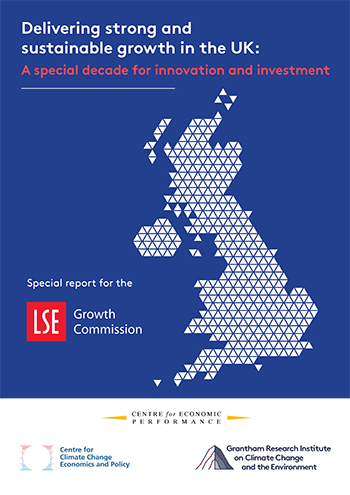UK Budget needs to include major zero-carbon investments to reposition its economy in next decade


The report by Nicholas Stern and co-authors finds that the government’s statutory commitment to net-zero emissions by 2050 can give the UK significant momentum in the race between economies to become cleaner, smarter and more efficient, and help the government achieve its ‘levelling up’ ambition for regional growth, if it makes the required policy changes and investments.
“The Budget should mark the start of a decade of massive investment in accelerating the transition of the UK economy to zero-carbon growth. This would mean that by 2030 the UK could have higher living standards, and better health and wellbeing, underpinned by UK businesses innovating and adopting cutting-edge zero-carbon technologies and practices fit for the mid-21st century,” said Lord Stern, Chair of Grantham Research Institute.
“The zero-carbon transition must also address ongoing poor productivity performance in the UK. Investment in zero-carbon infrastructure, while critical, will not be enough to attain sustainable and inclusive growth. Large-scale sustainable investment in innovation and skills across the country is also required. Immediate action with a long-term, predictable but dynamic outlook is needed.”
The report, which was produced for the LSE Growth Commission, recommends that the Budget kickstarts this programme with investment in sectors that are difficult to decarbonise, such as transport, industry and buildings. It suggests that low interest rates combined with targeted policies and financial instruments from the public sector can lower the cost of capital and raise private investment in net zero-aligned projects that can deliver prosperity for more people across the UK.
The report recommends that the government use the £6.3 billion committed for energy efficiency in the Conservatives’ 2019 election manifesto to reduce energy waste in buildings, which are responsible for 17 per cent of the UK’s emissions from greenhouse gases. It also recommends that the £1 billion committed in the 2019 election manifesto for infrastructure for the charging of electric vehicles should be focused on parts of the UK with lower traffic and population densities. It calls for the £800 million promised for new infrastructure for carbon capture and storage to be invested carefully to ensure it leverages private capital and should be accompanied by regional skills programmes.
“The economic and climate challenges faced by the UK require long-term and dynamic policies, implemented with a clear timetable and even clearer lines of accountability. There are several actions, if taken by this government, that would cement the UK’s leadership credentials, directly impact investment rates in the UK and create both a short-term boost to growth and improved growth prospects for the medium to long run,” said Anna Valero, a co-author of the report and ESRC Innovation Fellow at the Centre for Economic Performance at LSE.
The report recommends:
- Establishing a National Investment Bank with a focus on managing and reducing risk in infrastructure projects to leverage private finance. Action lead: HM Treasury
- Harnessing the UK’s green finance capabilities to deliver on innovation and investment demands across all regions. Action lead: Green Finance Institute
- Creating a shared global agenda of investment in zero-carbon infrastructure and innovation among Parties at COP26, leading by example. Action lead: COP26 Team within the Cabinet Office in close consultation with a range of other government departments
- Overhauling technical and governance processes to ensure public investment is aligned with the target for net zero emissions and resilient. Action lead: HM Treasury
- Giving clearer recognition to the roles of anchor institutions such as universities and further education colleges as drivers of place-based, sustainable growth. Action leads: Department for Education, Department for Business, Energy and Industrial Strategy, UK Research and Innovation
- Ensuring that policy decisions in infrastructure, innovation and skills are consistently aligned with the aim of sustainable and inclusive growth. Action lead: HM Treasury in close consultation with local government, and by extension communities, across the UK
- Utilising public sector procurement to pilot sustainable technologies. Action leads: HM Treasury and the Crown Commercial Service
- Setting out a timetable with key funding commitments into the medium term to deliver net-zero emissions, with lines of accountability for delivery. Action lead: HM Treasury
To read Delivering strong and sustainable growth in the UK: A special decade for innovation and investment please visit https://www.lse.ac.uk/granthaminstitute/publication/delivering-strong-and-sustainable-growth-in-the-uk
For further information and for interview requests please contact Niamh Brannigan at n.brannigan@lse.ac.uk or +44 (0) 7933997989
Notes for editors
About the Grantham Research Institute on Climate Change and the Environment
Established in 2008 at the London School of Economics and Political Science, the Institute brings together international expertise on economics, as well as finance, geography, the environment, international development and political economy to establish a world-leading centre for policy-relevant research, teaching and training in climate change and the environment. It is funded by the Grantham Foundation for the Protection of the Environment. www.lse.ac.uk/grantham/
About the Centre for Economic Performance
Established at LSE in 1990 CEP is one of Europe’s leading economic research centres. Comprising some 90 faculty, research staff and doctoral students, CEP studies the determinants of economic performance at the level of the company, the nation and the global economy by focusing on the major links between globalisation, technology, the educational system and the labour market and their impact on productivity, inequality, employment, stability and wellbeing. https://cep.lse.ac.uk/_new/about/default.asp

